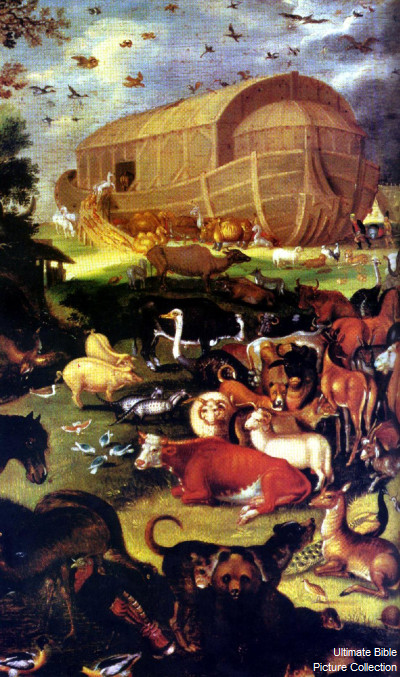There has long been a debate on the extent of the Flood of Noah. Was it literally worldwide? Or is that language intended to refer to the world as the Mosaic audience knew it. Either usage is possible, and can be seen in other uses.
Here is the primary description of the Flood (Genesis 7:17-24: "The flood continued forty days on the earth. The waters increased and bore up the ark, and it rose high above the earth. The waters prevailed and increased greatly on the earth, and the ark floated on the face of the waters. And the waters prevailed so mightily on the earth that all the high mountains under the whole heaven were covered. The waters prevailed above the mountains, covering them fifteen cubits deep. And
all flesh died that moved on the earth, birds, livestock, beasts, all
swarming creatures that swarm on the earth, and all mankind. Everything on the dry land in whose nostrils was the breath of life died. He
blotted out every living thing that was on the face of the ground, man
and animals and creeping things and birds of the heavens. They were
blotted out from the earth. Only Noah was left, and those who were with
him in the ark. And the waters prevailed on the earth 150 days."
However, I think that there are two contextual references that require a literal global interpretation of that passage.
The first is in the prior chapter (Genesis 6:11-13): "Now the earth was corrupt in God’s sight, and the earth was filled with violence. And God saw the earth, and behold, it was corrupt, for all flesh had corrupted their way on the earth. And God said to Noah, 'I have determined to make an end of all flesh, for the earth is filled with violence through them. Behold, I will destroy them with the earth.'" So, God tells us that mankind was thoroughly corrupt, such that He, anthropomorphically speaking, regretted creating them. The relevance of this is that a regional flood would not have dealt with a worldwide problem.
Furthermore, to cut off any claim that this is mere hyperbole, it is not rational to believe that such a radical solution would have been required for a merely-regional problem. Therefore, we are logically compelled to believe that the Flood was necessarily worldwide.
The second issue is back in chapter 7 (Genesis 7:2-9): "'Take with you seven pairs of all clean animals, the male and his mate, and a pair of the animals that are not clean, the male and his mate, and seven pairs of the birds of the heavens also, male and female, to keep their offspring alive on the face of all the earth. For in seven days I will send rain on the earth forty days and forty nights, and every living thing that I have made I will blot out from the face of the ground.' And Noah did all that the Lord had commanded him. Noah was six hundred years old when the flood of waters came upon the earth. And Noah and his sons and his wife and his sons’ wives with him went into the ark to escape the waters of the flood. Of clean animals, and of animals that are not clean, and of birds, and of everything that creeps on the ground, two and two, male and female, went into the ark with Noah, as God had commanded Noah."
So, as part of the preparation for Noah and his family, God commanded him to collect samples of every animal, presumably limited to land animals ("everything on the dry land," 7:22), two of some kinds, seven (or seven pairs) of other kinds. Thus, provision is made for the entire ecological system on which man is dependent. But why? If the Flood were merely regional, then God could merely have caused them to migrate beyond the range of the Flood. They would have been preserved by not having to pass through the high waters at all. However, their survival is guaranteed, not by migration, but by resorting to the Ark with Noah. Again, that is rational only if we take the Flood as general, worldwide, and not merely regional.

No comments:
Post a Comment